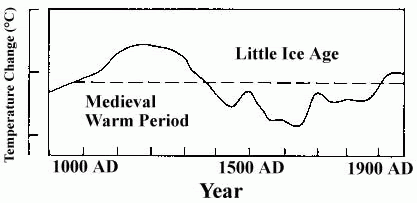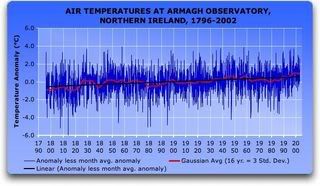“Wouldn’t it be nice if more of our summer days were like this?” We sighed, thinking how global warming might one day make our dream a reality, if it would just hurry up.
It reminded us of the almost perfect weather we had on our four-month European bike trip the summer of 1998. It still seems unbelievable we had such glorious weather for such a long period, June until early October.
Fortuitously, all of my research into global warming panic introduced me to the claim that 1998 was the warmest year on record.
In the roundly discredited “hockey stick,” its creator, Michael E. Mann, said there “is a 99 percent certainty that 1998 is the warmest year in the (millennium).”

Notice the Medieval Warm Period is totally within the millennium under consideration.
Wouldn’t you know it, with odds of 100 to 1 that 1998 was the hottest in a thousand years, it only tied as the hottest of its century.
The National Oceanic and Atmospheric Administration said 1998 tied 1934 as the warmest year on record, with 1921 a close third. The chances are excellent that there were even warmer years about a thousand years ago, but thermometers have only been in use to systematically record temperatures since 1850, and only by 1890 were there finally enough global weather stations to give widespread climate observations (although predominantly in the Northern Hemisphere).
As far as “warmest in the millennium” goes, a Harvard study of over 240 climate studies debunked the “hockey stick,” and concluded that the Medieval Warm Period (AD 800 to 1350) was a world wide phenomenon, and that it was warmer than the present.

Over 200 years of continuous temperature measurement at Armagh Observatory, Northern Ireland. The period of cooling between 1960 and 1990 is interesting because atmospheric CO2 was increasing rapidly during the period, even though temperatures were falling.
Coincidently, when thermometers came into widespread use after 1850, that just happened to be the end of the Little Ice Age, and temperatures have been increasing naturally ever since -- as one would expect following a five-hundred year cold spell.
Which followed a five-hundred year warm period (Medieval Warm Period).
Which followed a five-hundred year cold spell (Dark Ages).
Which followed a five-hundred year warm period (Roman Warm Period).
(Do you see a pattern here? If you don’t, Tipper may be able to help you, Al.)
Unfortunately, the gorgeous weather we experienced on our bike trip was a result of El Niño, one of the two strongest of the past century, followed by La Niña in mid-1998. While we were enjoying warm, clear days, much of the rest of the world was either suffering catastrophic flooding, a large number of unusually strong hurricanes, or ruinous drought.
The man-caused global warming prognosticators tried to make 1998 a poster child for their panic mongering, but actual weather scientists pointed out that El Niño and La Niña, and their weather consequences, were part of a naturally occurring cycle which had been identified and tracked for several hundred years.
Of course, the panic mongers then clutched Hurricane Katrina as the “next sure sign,” but again experienced weather scientists pointed out that “we're in an active hurricane cycle – a phenomenon of heightened activity that can last for decades. The last one spanned the 1940s through 1960s. The current one started in 1995 and could last for another decade…”
To recap the obvious, hurricane activity was strong during the 1940s through 1960s – lower carbon dioxide in the atmosphere – and slacked off then until 1995 – higher atmospheric carbon dioxide.
Do the global warming alarmists think that no one can make the connection between low hurricane activity when CO2 was high, and high hurricane activity when CO2 was low?
And still blame the current increased hurricane activity on global warming caused by an increasing concentration of atmospheric carbon dioxide?
Then why didn’t it cause more hurricanes during the previous 25 years when CO2 was increasing rapidly?
It just doesn’t make sense, does it Al?
Man caused global warming has always been a conclusion looking for a science to justify it.
When greenhouse gases were identified, it was readily apparent that water vapor and clouds were the primary drivers. However, it was also readily apparent that mankind could not be held responsible for water vapor and clouds, so those looking for something for which to blame man’s (primarily the United States’) economic progress, had to settle for a small player in the greenhouse gas pantheon, carbon dioxide.
Since carbon dioxide is only about ten percent of the greenhouse gas effect, and only about three percent of carbon dioxide is produced by man – the rest by Nature – the blame mankind crowd needed another theory, and came up with the concept of the “tipping point,” i.e., that humanity added just the tiny bit extra to one small component of greenhouse gases that triggered global warming.
Entirely overlooked was that climate records show historic periods when warming occurred much faster, and Earth became much warmer than presently, and all of it without a human component.
Those records also show global warming preceding increased levels of CO2 by hundreds of years, and cooling occurring during periods of elevated atmospheric CO2.
Of course, historical climate records also show hundreds of cycles of warming and cooling, with far greater consequences for life forms than the current cycle, and all caused by natural forces.
In only a flicker of cosmic time, the Earth has gone from great ice sheets covering half of North America just over 10,000 years ago to today’s seasonal polar ice caps. In that short time span, sea levels have risen over 400 feet.
Human kind made good use of the natural global warming of the last 10,000 years, and developed rapidly from primitive hunter-gatherers through our ever-more rapidly changing stages of progress.
The best is yet to come.
No comments:
Post a Comment